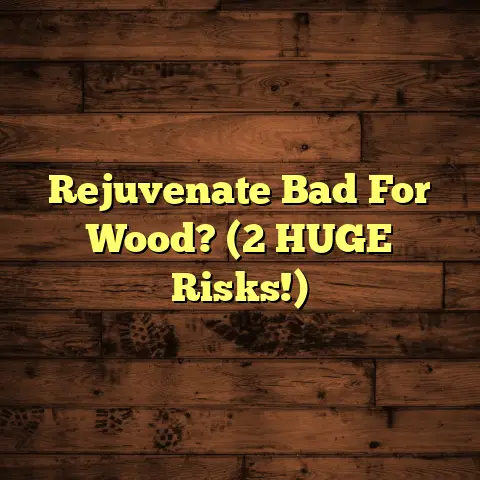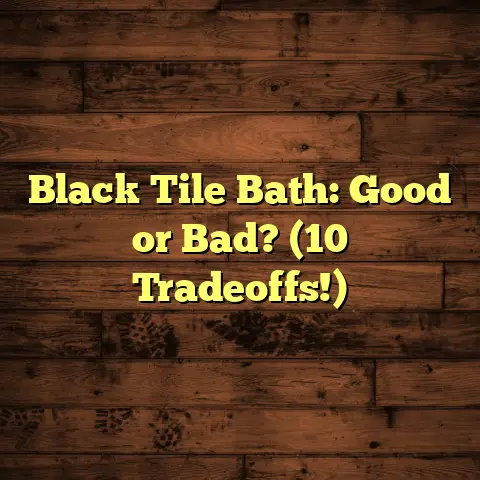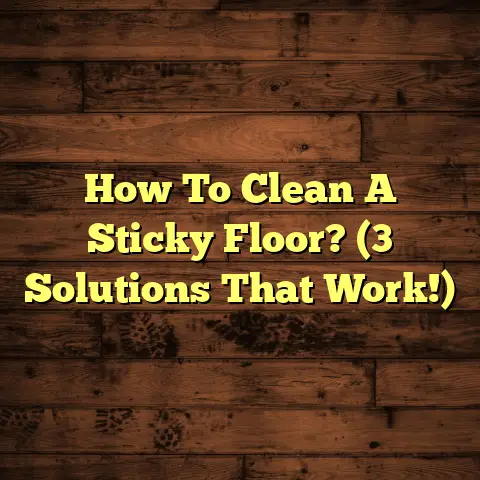Does Rubbing Alcohol Damage Laminate Flooring? (Explained)
Imagine walking into your beautiful home, where the laminate flooring shines under the soft glow of the afternoon sun.
You notice a stubborn stain on the floor, and your first instinct is to grab a bottle of rubbing alcohol.
But wait—does using rubbing alcohol on laminate flooring damage it?
This question has crossed my mind many times throughout my 15 years as a flooring contractor, and it’s one that I often hear from clients.
The Popularity of Laminate Flooring
The popularity of laminate flooring has surged over the years due to its affordability, ease of installation, and wide variety of styles.
Homeowners appreciate the ability to achieve the look of hardwood without the associated costs and maintenance.
In my experience, laminate flooring has become a staple in both residential and commercial spaces.
Cleaning and Maintenance of Laminate Flooring
While laminate flooring is durable, it requires proper cleaning and maintenance to preserve its appearance and longevity.
Regular maintenance not only keeps the floor looking great but also extends its lifespan.
Common Cleaning Methods
- Dry Mopping: Using a microfiber mop or broom to remove dust and debris is essential.
I recommend doing this daily or at least a few times a week, especially in high-traffic areas. - Damp Mopping: For deeper cleaning, using a damp mop with warm water and a few drops of mild dish soap is effective.
I often tell clients to avoid excessive water, as standing water can damage the seams of laminate flooring. - Spot Cleaning: For spills or stains, it’s crucial to act quickly.
Blotting the area with a clean cloth can prevent staining and damage. - Commercial Cleaners: There are many products specifically designed for laminate flooring that effectively clean without harming the surface.
The Impact of Rubbing Alcohol
Rubbing Alcohol: Pros and Cons
Rubbing alcohol, or isopropyl alcohol, is commonly used for its disinfectant properties.
It evaporates quickly and leaves no residue, which makes it appealing for cleaning surfaces.
However, I’ve found that using it on laminate flooring can have mixed results.
Successes with Rubbing Alcohol
In my early days as a contractor, one of my clients was adamant about using rubbing alcohol for cleaning their laminate floors.
We decided to test it in a small area before applying it throughout the entire space.
To our surprise, it effectively removed some stubborn stains without leaving any visible damage.
For instance, we had a situation where a pet had an accident on the floor, leaving behind an unsightly stain.
A small amount of diluted rubbing alcohol worked wonders in lifting the stain without damaging the finish.
My client was thrilled with the results.
Dangers of Overuse
However, after repeated applications, I started noticing issues.
Rubbing alcohol can be harsh if used frequently or left on the surface for too long.
In one instance, I used it to clean an area that had accumulated grime over several months.
While it initially looked great, over time I noticed that the finish had dulled significantly, and there were some discolorations.
This experience taught me to be cautious when recommending rubbing alcohol as a cleaning solution for laminate flooring.
While it can be effective for spot cleaning, overuse can lead to damage and diminished appearance.
Alternatives to Rubbing Alcohol
Through my years in the industry, I’ve explored various cleaning options for laminate flooring:
- Mild Detergent and Water: This is my go-to solution for routine cleaning.
A few drops of dish soap mixed with warm water work wonders without risking damage.
It’s gentle yet effective for maintaining cleanliness. - Vinegar Solution: A mixture of vinegar and water can effectively clean while being gentle on the surface.
I often use a 1:1 ratio of vinegar to water for regular maintenance.
It not only cleans but also helps with odor removal. - Commercial Laminate Cleaners: These are specifically formulated for laminate and can provide excellent results without the risks associated with rubbing alcohol.
Many brands offer eco-friendly options that are safe for both pets and children. - Baking Soda Paste: For tougher stains, I mix baking soda with water to create a paste.
Applying this gently with a soft cloth can lift stubborn marks without scratching the surface.
Cost Considerations in Cleaning Solutions
When considering costs for a flooring project, I often use FloorTally to help with estimates and budgeting.
For instance, if we were looking at replacing a section of laminate flooring due to damage caused by improper cleaning methods like rubbing alcohol, FloorTally allows me to pull local material and labor rates quickly.
Using FloorTally has been invaluable in providing accurate quotes and ensuring that my clients understand potential expenses upfront.
For example, when estimating costs for replacing damaged planks in a 1,000-square-foot area, I can input variables like material type and labor rates to provide an estimate within minutes.
Personal Experiences with Laminate Flooring Maintenance
Throughout my career, I’ve encountered numerous situations involving laminate flooring maintenance and repair.
Here are some personal stories reflecting both successes and challenges I’ve faced:
Success Story: Reviving Dull Floors
A few years ago, I worked with a family who had recently installed laminate flooring in their new home.
They loved the look but were frustrated when they noticed their floors appeared dull after just a few months.
After some investigation, we discovered that they had been using harsh cleaners and rubbing alcohol regularly.
I suggested a thorough cleaning regimen using mild detergent and warm water instead.
We spent an afternoon deep cleaning their floors together, followed by applying a specialized commercial laminate cleaner that revitalized their finish.
The family was ecstatic with the results; their floors looked brand new again!
Challenge: Dealing with Scratches
In another project, I encountered a client whose laminate floors had developed scratches over time due to furniture movement and improper cleaning methods.
They had used rubbing alcohol frequently in an attempt to keep their floors looking pristine but inadvertently contributed to their deterioration.
To address this issue, I recommended using furniture pads under chairs and tables to prevent further scratching.
We also discussed using a scratch repair kit specifically designed for laminate flooring to address existing marks effectively.
Practical Tips for Maintaining Laminate Flooring
Based on my experiences over the years, here are some practical tips for maintaining your laminate flooring:
- Avoid Excessive Water: Always use a damp mop instead of soaking wet mops to prevent water damage.
- Use Soft Tools: Microfiber mops or soft cloths are ideal for cleaning without scratching the surface.
- Act Quickly on Spills: Clean spills immediately to avoid stains and potential damage.
- Choose Appropriate Cleaners: Stick with products designed for laminate flooring to minimize risks.
- Rotate Rugs: If you have area rugs on your laminate floors, rotate them periodically to prevent uneven fading.
- Regular Maintenance: Establishing a regular cleaning schedule will help maintain your floors’ appearance over time.
Conclusion
In summary, while rubbing alcohol can be effective for cleaning laminate floors in specific situations, its potential to damage the surface makes it less suitable as a regular cleaning solution.
My advice is to stick with gentler cleaning methods like mild detergent or vinegar solutions for routine maintenance.
By sharing my experiences and insights throughout this article, I hope you feel more confident in maintaining your laminate flooring.
Remember that prevention is key; always test any cleaning product in an inconspicuous area first to avoid any unexpected issues.
Final Thoughts
As someone who has worked extensively with laminate flooring over the years, I understand how important it is to keep your floors looking their best while ensuring their longevity.
With proper care and attention—combined with knowledge about what products to use (and what not to use)—you can enjoy beautiful laminate floors that enhance your home for many years to come.
If you have any specific questions or concerns about your laminate flooring or need advice tailored to your situation, don’t hesitate to reach out!
Your beautiful home deserves nothing less than expert care.





